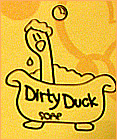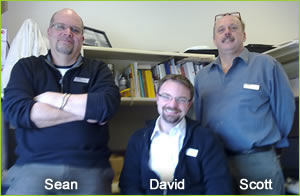

Written by Louisa Lambregts, Centre for Organizational Learning
Treat yourself to the culinary delights of Duck á L'Orange and Peking Duck -- from the comforts of your own bathroom.
 Yes, you have read this right and no, I'm not suggesting that you eat take-out in your bathtub!
Yes, you have read this right and no, I'm not suggesting that you eat take-out in your bathtub!
The School of Hospitality and Tourism is championing a sustainability project with a flavour (pun intended) that is all their own. David Fairbanks and his colleagues Sean Edwards and Scott Warrick have worked out a way to create soap from reclaimed duck fat. It has spun into a student project where they produce batches of soap and sell it through Savoir Fair. Students came up with the brand name, the flavour ideas, and the marketing materials.
The bars were available for sale this week for the first time and the current batch has already sold out!
 David explains that animal fat becomes purified during the soap-making process. Plus, many of the commercial, mass-produced soaps that we purchase include animal fats (tallowate) and a long list of synthetic addititives. In effect, when you grab that bar of Ivory soap, you are washing with sodium tallowate that is made largely from cows and pigs. Dirty Duck soap is comprised of simply animal fat, lye, water, and "flavour" essences.
David explains that animal fat becomes purified during the soap-making process. Plus, many of the commercial, mass-produced soaps that we purchase include animal fats (tallowate) and a long list of synthetic addititives. In effect, when you grab that bar of Ivory soap, you are washing with sodium tallowate that is made largely from cows and pigs. Dirty Duck soap is comprised of simply animal fat, lye, water, and "flavour" essences.
New soap "flavours" are planned for future batches that reflect time-honoured recipes such as cassoulet.
Dirty Duck soap is the beginning of what David, Sean, and Scott hopes could be a "back to basics" program focus for the Culinary Program. In the fast-paced restaurant industry, many of the ingredients arrive pre-packaged and pre-processed. There is concern that students and new culinary professionals entering the industry lose their understanding of where food and ingredients come from. Their hope is to introduce into the program hands-on experience with canning and making preserves as a way to instill a foundational understanding of how mainstay ingredients and condiments are made. The students could also brand and sell these products.
If you would like to learn more about Dirty Duck or this unique sustainability project, (or, if you would like to recommend a soap flavour), contact David Fairbanks at fairbad@algonquincollege.com or call extension 5266.
Legend has it that soap got its name during Roman times from Mount Sapo, where animals were sacrificed. Rain washed a mixture of melted animal fat (tallow) and wood ashes down into clay soil along the Tiber River. As women did their washing, they found that this clay made things cleaner with much less effort.